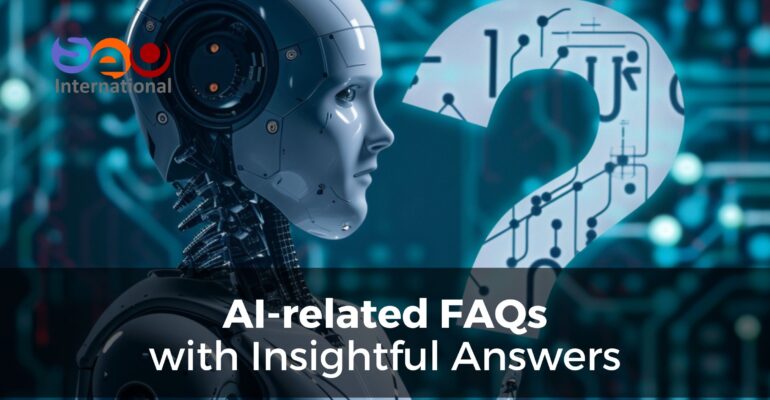[Videos] AI in Marketing – FAQs with Insightful Answers
March 14, 2024 2024-03-27 20:36[Videos] AI in Marketing – FAQs with Insightful Answers

[Videos] AI in Marketing – FAQs with Insightful Answers
AI holds immense importance in marketing and digital marketing due to its transformative capabilities. AI allows marketers to analyze massive data sets, revealing invaluable customer insights about preferences, behaviors, and trends. This enables hyper-personalized campaigns, targeted with laser precision for better engagement and conversions. AI streamlines processes, optimizing ad spending, chat interactions, and content creation. Through the power of predictive analytics, AI forecasts customer behavior and market shifts, ensuring businesses remain proactively aligned with their audience. This combination of efficiency, personalization, and future-focused analytics gives marketers a clear competitive edge in the digital world.
This blog post contains many questions related to AI in Marketing and Digital Marketing, and answers by the experts in the industry:
What is the future role of humans? I feel threatened by AI.
In a dialogue with Cathy McPhillips, Paul Roetzer of the Marketing AI Institute emphasizes the crucial choice facing individuals and organizations: to embrace or ignore AI. Roetzer advocates for a proactive stance towards AI, highlighting its potential to disrupt yet offer new opportunities. He suggests that future success lies not just in technical AI skills but in a diverse skill set adaptable to an AI-enhanced world. Embracing AI, understanding its impact on one’s career, and leveraging it for efficient problem-solving can make individuals valuable change agents in their industries. This approach underscores the importance of adapting to and capitalizing on the opportunities AI presents.
What steps can I take today? How do I identify ways to start?
The problem-based approach to AI integration focuses on identifying and addressing specific organizational challenges to enhance efficiency and profitability. By pinpointing tasks that hold the greatest value and leveraging AI tools to streamline these areas, organizations can accumulate significant time savings and operational improvements. An example of this strategy’s success is the use of AI writing tools, which not only saved 25% of the time for content creation but also boosted the return on ad spend by 40% for ad management tools. This demonstrates a promising beginning for AI integration, suggesting that carefully selecting AI solutions to solve specific problems can lead to substantial benefits.
What are today’s copyright regulations? How do we handle data?
The U.S. Copyright Office states that providing a prompt to AI does not constitute authorship, emphasizing that copyright ownership requires human-created content. This guideline prompts a reevaluation of what level of human contribution is considered authorship, especially as AI assists in tasks like transcription and content formatting without needing copyright. The role of AI in content creation, including ghostwriting, raises questions about copyright laws and ownership, highlighting the need for careful legal consideration regarding AI-generated content and the specific instructions that guide its creation.
What guidelines should companies follow regarding AI & privacy?
Employees must avoid sharing confidential information with AI models like ChatGPT to prevent it from being inadvertently used in future training datasets. Companies are advised to create robust AI policies to protect privacy and ensure AI is used responsibly. Additionally, ensuring ownership of AI-generated content, especially when working with freelancers, is crucial for maintaining confidentiality and control over proprietary information. This vigilance is key to safely integrating AI into business practices.
How far have AI tools come & what can we expect moving forward?
The potential of AI is expanding rapidly, moving beyond its current capabilities to surprise and impress daily. What we see today is just the beginning, with future AI expected to handle not just language but also images, videos, audio, and code, indicating a shift toward multimodal capabilities. This evolution will allow AI to not only provide recommendations but also autonomously perform actions, such as booking travel, making its applications more integrated and actionable in our daily lives. Essentially, the AI we’re familiar with today is set to become much smarter, more versatile, and increasingly integrated into various aspects of our lives and work.
As AI technology advances, how will agencies be impacted?
Paul Roetzer, from the Marketing AI Institute, highlighted AI’s potential to disrupt traditional agency models by performing tasks much faster, suggesting a shift away from billable hours. He envisions a future where agencies specialize in AI consulting across all industries and predicts that enterprises will develop bespoke language models, leading to a lucrative consulting market focused on AI integration and advice. This outlook points to a significant transformation in how businesses and agencies will operate and thrive in an AI-driven landscape.
Can AI replace or supplement roles like graphic designers?
AI tools democratize data analysis for non-designers, enabling easy creation of visualizations without advanced skills. While AI aids in editing and project management, tasks requiring deep creativity, like making a speaker reel, still depend on human expertise. This highlights the essential role of professionals in creative fields, affirming that AI complements rather than replaces human creativity.
How can someone verify the content generated by AI?
Integrating AI-generated content into legal arguments raises serious concerns about the authenticity of citations, potentially leading to falsified references and significant legal ramifications. This approach undermines the integrity of legal documentation and may result in misleading the court, jeopardizing the credibility of legal professionals and affecting the outcome of legal proceedings.
Do marketers using AI need to worry about plagiarism?
The video highlights challenges in marketing with AI, particularly the risk of plagiarism since AI can replicate and present information without citing sources. It points out that despite GPT-4’s seemingly advanced intelligence, it merely simulates human actions without true understanding. The discussion also raises concerns about the effectiveness of AI detection tools, suggesting that as these tools struggle at scale, newer AIs could be developed to alter content subtly, making detection increasingly difficult.
How can marketing teams work with their AI/IT/tech teammates?
Narrated by Paul Roetzer, Founder & CEO of the Marketing AI Institute, the video underscores the significance of cohesive collaboration between marketing and IT/AI teams to navigate the evolving AI landscape successfully. It highlights the necessity for cross-disciplinary teamwork and the importance of engaging in internal discussions about the impact of AI projects on their success and scalability, especially in smaller organizations that might opt to outsource IT functions. Roetzer’s insights emphasize the growing interdependence among various departments in steering the future direction of AI initiatives.
How do we decide which AI tech is right for our company?
Navigating AI startups can be challenging for marketers due to many lacking customer support, onboarding materials, and partnership programs, making it hard to choose suitable investments. Proceeding without adequate support risks complications. For Fortune 1000 companies, trusting the vendor’s stability and long-term viability is essential when implementing AI technology to ensure scalability and reliability.
How can you navigate building a tech stack using AI tools?
Businesses should carefully navigate the evolving landscape of AI tools by considering the rapid technological changes in marketing and consulting experts to build an effective tech stack. Starting with the core of existing infrastructure is advisable when integrating AI-powered solutions from startups. Soon, transparency about AI strategies will become essential for companies to remain competitive and credible in the market.
How can writers maintain their value in an AI world?
Writers can preserve their unique value against AI by focusing on authentically human content like in-person events and interviews. The future of content creation lies in a synergy between AI assistance and human creativity, ushering in a new era. Authenticity in human-created music and art will retain more value than AI-generated alternatives, emphasizing the irreplaceable quality of human touch in creative endeavors.
How can marketers balance AI, human touch, and creativity?
Paul Roetzer, Founder & CEO of the Marketing AI Institute, highlights how AI, like GPT-4, acts as a strategic tool, enhancing creativity across various tasks and enabling professionals and non-professionals alike to explore new creative avenues. AI’s capacity to communicate complex visions effectively offers a unique advantage in bringing ideas to life, transforming the creative process, and expanding the realm of possibilities for individuals in any field.
What does generative mean in the context of AI?
Generative AI is the ability to generate content in various forms like language, image, video, audio, and code, impacting all areas of marketing and communication.
Examples of AI in Marketing
What is AI in Marketing and Why it Matters? Answered by Najam Ahmed from SEO International, Dubai
15 AI Questions Everyone is Asking – Answered by Paul Roetzer, Founder & CEO, Marketing AI Institute
AI is transforming businesses and careers by becoming more accessible and practical for use. Tools like GPT-4 can assist in strategic planning and ideation, enhancing creativity across professions. The future will see AI tailored to individual enterprise needs, with advancements like multimodal capabilities integrating various media types into one platform. Success in AI implementation relies on focusing on specific, value-generating use cases. Embracing AI necessitates a reevaluation of roles and skills within organizations, pointing towards a new era for professionals and marketers.


